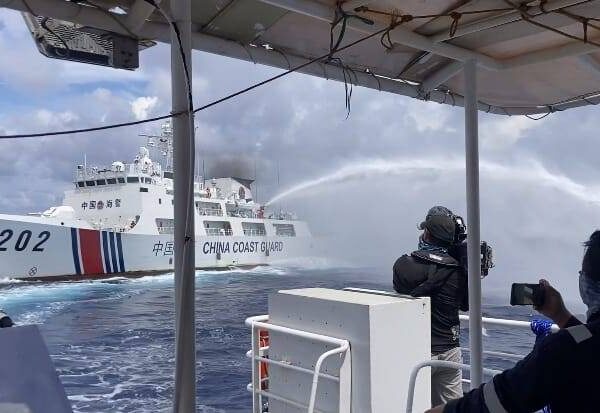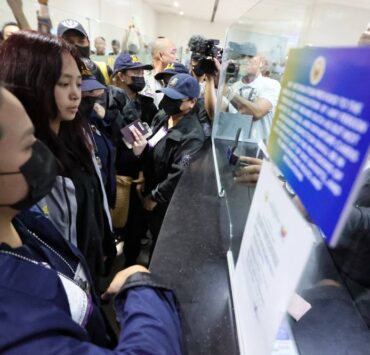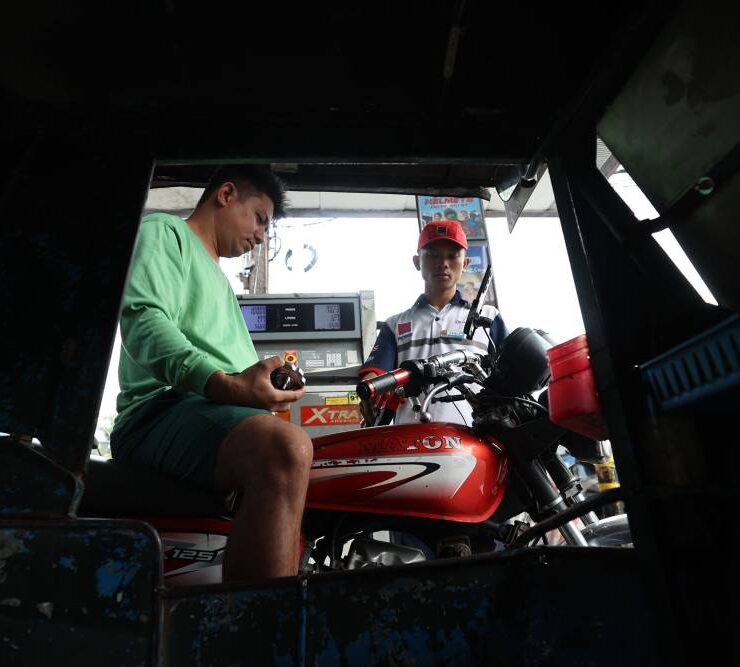No letup: Chinese vessels block PCG ships at Escoda
- Chinese coast guard and navy ships harass the BRP Cabra and BRP Cape Engaño about 28 nautical miles from the shoal, a day after they rammed and fired water cannons at a Philippine vessel on a humanitarian mission in the area.

ABOARD THE BRP CABRA, WEST PHILIPPINE SEA—Chinese vessels on Monday blocked and surrounded Philippine Coast Guard (PCG) ships to stop them from reaching Escoda (Sabina) Shoal in the West Philippine Sea for a supply run, the latest confrontation in an emerging flashpoint between Manila and Beijing.
At least six China Coast Guard (CCG) vessels, backed by three ships from the People’s Liberation Army Navy, moved to stop the BRP Cabra and BRP Cape Engaño when they were around 28 nautical miles (51.85 kilometers) from the shoal, or about 50 nautical miles (92.6 km) from Palawan mainland.
The Inquirer was among the journalists invited by the PCG on one of the two ships deployed for the supply run. The BRP Cape Engaño was earlier damaged from collisions with Chinese vessels during an Aug. 19 incident.
The attempt to resupply came a day after Chinese vessels rammed and pummeled a Bureau of Fisheries and Aquatic Resources (BFAR) ship with water cannons to disrupt a mission to aid fishermen and bring supplies to the BRP Teresa Magbanua, which has been parked at the shoal since April amid the continued presence of Chinese militia and suspected reclamation activities.
China claims the shoal, known to them as Xianbin Jiao, despite being only 75 nautical miles (139 km) from the coast of Palawan.
Standoff
The two PCG ships departed the sleepy village of Buliluyan before 5 a.m. on Monday, running at a speed of 10 knots (18.52 km per hour) with overcast skies and rough seas on its way to the shoal. By noon, the Chinese vessels were already on the horizon, ready to restrict them from coming closer.
The Philippine ships did not insist on advancing further toward the shoal after they were surrounded by Chinese vessels, but radio challenges were exchanged to assert each other’s territorial claims.
The ships sailed back home after about four hours of deadlock.
While there was less violence from Beijing during Monday’s incident compared to previous occasions, it was reminiscent of the situation in the nearby Ayungin (Second Thomas) Shoal, where the resupply missions to the BRP Sierra Madre, the Philippine Navy’s outpost at Ayungin, have been frequently harassed by Chinese ships.
“They’re more strict now,” said one crew member, referring to China over the situation at Escoda.
China claimed it took “control measures” on Monday against the two PCG ships that had supposedly entered its waters.
Plain treachery
Lawmakers on Monday condemned the latest incident involving the BFAR boat on Sunday.
Sen. Juan Miguel Zubiri said this proved to be a “blatant disrespect of the earlier understanding of de-escalation” between China and the Philippines.
“China’s rudeness has been repeated again and again. It has once again reneged on its word and on its honor… It is treachery, plain and simple,” Zubiri said in a statement.
Sen. Joel Villanueva noted that the recent provocations from China were not just uncalled for but a blatant disregard of the United Nations Convention on the Law of the Sea.
“We urge the international community, especially our friends and allies, to join us in demanding that China cease these aggressive actions and work toward maintaining peace and stability in the region,” he said.
Sen. Loren Legarda also strongly condemned the latest incident, stressing that China’s actions “are not only illegal but inhumane and cruel to the safety of those at sea.”
Sen. Nancy Binay called on the government of China to immediately “cease and desist from all inflammatory actions that test the limits of our nation’s goodwill.”
Pursue dialogue
In the Lower House, Speaker Martin Romualdez on Monday renewed his call for Beijing to respect international law and exercise restraint in the West Philippine Sea, expressing alarm over China’s “increasingly aggressive” actions in the area.
Romualdez condemned in the strongest terms the “reckless and dangerous” maneuvers by the CCG on the BFAR vessel.
The Speaker noted that Sunday’s incident was the second in a week that China “used its might to harass and terrorize our vessels and personnel inside our own territory,” citing a similar incident on Aug. 19.
Romualdez said that China should pursue consultations and dialogue in resolving conflicts instead of resorting to confrontation and aggression.
Defense Secretary Gilberto Teodoro Jr. said on Monday that China’s actions were “patently illegal” and “we have to expect these kinds of behavior from China because this is a struggle.”
Asked if the latest incident would trigger defense treaty obligations between the United States and the Philippines, Teodoro said: “That is putting the cart before the horse. Let us deter an armed attack, that is the more important thing.”
No provocation
The National Maritime Council (NMC) likewise pointed out that the repeated actions of harassment by China’s combat aircraft and CCG vessels puts in question China’s commitment to de-escalate the situation in the West Philippine Sea.
“The Philippine government deplores the repeated aggressive, unprofessional and illegal actions displayed by Chinese maritime forces against Philippine vessels and aircraft over the past week,” the NMC said.
“That these provocative and dangerous actions were made in the space of only a week is alarming, and calls into question China’s supposed commitment to de-escalate the situation in the area and create a conducive environment for dialogue and consultation,” the NMC said.
The NMC “strongly” urged China “to return to the path of constructive dialogue on matters related to the West Philippine Sea,” while giving assurance that the Philippines would continue to pursue diplomatic approaches in asserting its sovereign rights over the area.
“It should be made clear that the Philippines has never provoked the People’s Republic of China, which in turn has relied on deliberate and intentional harassment and intimidation to interfere with Philippine sovereign operations, and endanger the safety of Filipinos aboard Philippine vessels and aircraft conducting their routine missions,” the NMC said. —WITH REPORTS FROM TINA G. SANTOS, JEANNETTE I. ANDRADE, MELVIN GASCON AND REUTERS INQ




















